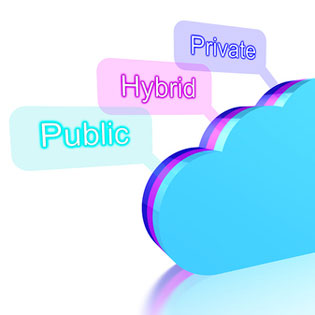Are Hybrid Cloud Solutions Right for Your Medical Practice?
December 20, 2016

The primary focus on cloud computing in healthcare is how much it can reduce IT costs. This is an important quality for any institution, but another factor to consider is security. The public cloud offers higher cost savings to the company, but the private cloud allows the company to retain a stronger control over its data. Luckily, these are not the only two options. The third option is the hybrid, which is a combination of the private and public cloud structures. The hybrid allows companies to secure their information, but retain the advantage of software on demand. Hybrid cloud solutions, like those provided by TOSS C3, can have your network secure, but still as flexible as you need it to be.
Security
Those in the healthcare industry are required by law to meet strict compliance and regulatory guidelines. Since telemedicine is becoming more common, it is important for information to have the ability to share across multiple districts or states. The cloud-stored information must remain secure, automated, and programmable at all times. This would lead most to think toward the private cloud. And that is your best bet, if you are only concerned about the security. However, security is only one aspect of hybrid cloud solutions that need to be considered. For more information you can purchase the book:
Okay, then I Just Need a Private Cloud, Right? No.
The private cloud is great for security, but remember, that means everything is stored locally. Most of the information stored in electronic medical records (EMR) is onsite already, but if everything remains onsite and there is a disaster, then you lose everything. Backing up to a public cloud helps to keep your data dispersed and easily retrievable, but not as secure as a private cloud. So it looks like what you need is a hybrid that can do both.
The Hybrid
A hybrid cloud solutions provider can help you with the specific details and advantages of this type of infrastructure. According to Canadian Health Systems, “In order to take advantage of the connectivity provided by the cloud, your EMR system needs to be based on a hybrid cloud infrastructure. Mission-critical applications and data can be stored on-premises to ensure that clinic operations will continue unscathed should an outage be experienced with your cloud provider or ISP. This strategy allows medical organizations to scale seamlessly, share files, and work from anywhere, while keeping operational costs to a minimum and ensuring that service remains continuous in the event of an outage.”
The hybrid environment is truly the best of both worlds. It’s important that healthcare providers rationalize applications and create their own cloud-based strategies that take advantage of a private cloud in their organization. It is also important to have the versatility of the public cloud, so the hybrid may be the best solution. The hybrid design makes it possible for unified computing systems (UCS) and servers to seamlessly unify computing, networking, management, virtualization and storage access into a single integrated architecture.

Subscribe now and stay up to date with News, Tips, Events, Cybersecurity, Cloud and Data Compliance.